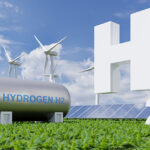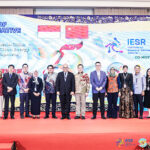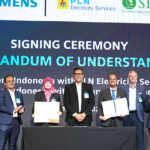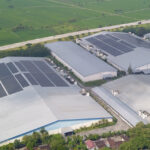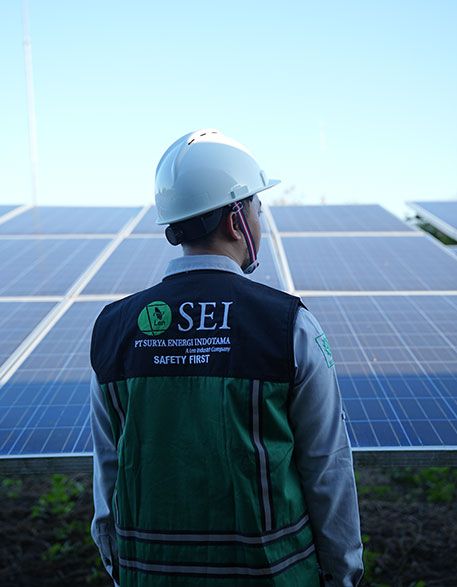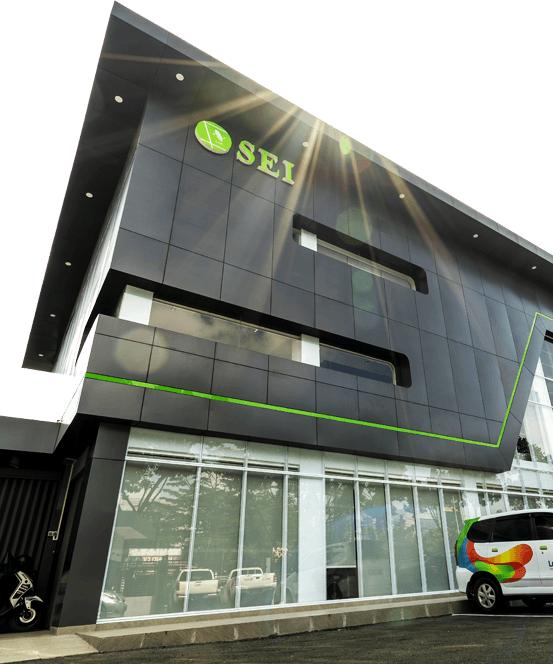Tag: Energi Baru Terbarukan

Getting to Know Green Hydrogen and Indonesia’s Great Potential
In the global effort to reduce carbon emissions and achieve the Net Zero Emissions target, green hydrogen is now a major focus in the world's clean energy transition. As a country with abundant natural resources, Indonesia is in a very strategic position to take an important role in the future clean energy supply chain.
Green hydrogen is touted as the key to realizing a low-carbon energy mix, because it can be used across sectors from transportation, heavy industry, to electricity generation without producing carbon dioxide emissions. In this context, Indonesia not only has the potential as a user, but also as a producer and exporter of green hydrogen in the Asian region and the world.
Actually, what makes green hydrogen so popular? Let's take a look at the summary of Green Hydrogen!
What is Green Hydrogen?
Green hydrogen is hydrogen produced through the process of water electrolysis, which is the separation of water molecules (H₂O) into hydrogen (H₂) and oxygen (O₂) using electricity from renewable energy sources such as solar, wind, or water.
Through this process of electrifying water, hydrogen becomes an effective energy carrier with high energy density. As an illustration, a hydrogen-fueled vehicle only takes 3-5 minutes to fully recharge. This is much faster than recharging the battery on an electric vehicle which takes up to 10 hours for home charging.
The term green hydrogen has only been used recently to distinguish other hydrogen that comes from natural gas or coal (gray hydrogen). While there is blue hydrogen if emissions from gray hydrogen are injected back into the ground. There is also hydrogen that is produced with the help of nuclear energy (pink hydrogen).
From this it can be said that green hydrogen is considered the only form of carbon-free hydrogen.
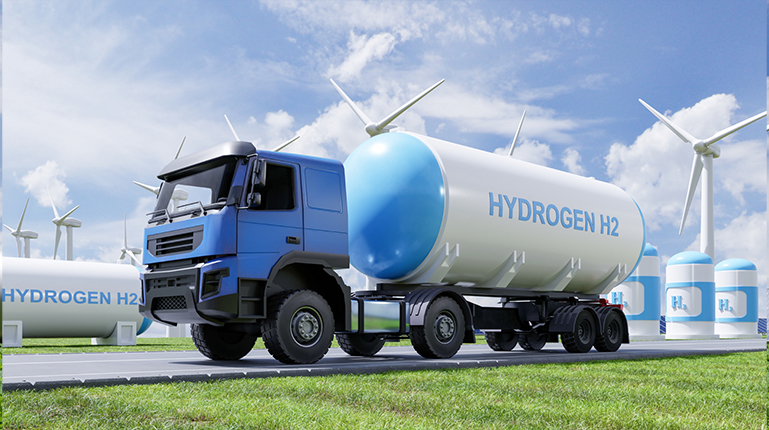
Benefits and Advantages of Green Hydrogen
Green hydrogen has various strategic benefits including:
✅ Zero-Carbon Energy Carrier, Green hydrogen produced from renewable energy can be stored as carbon-free energy.
✅ Long Term Storage Solution, Hydrogen tanks have a larger capacity and are easier to increase in capacity than batteries, and can be used as a source of electrical energy when needed.
✅ Alternative to Diesel Backup Power, more environmentally friendly and suitable for remote areas and as a power backup.
✅ Promising Market Potential, Based on data quoted from plnp_upkendari, the global green hydrogen market could reach USD 90 billion by 2030.
The Huge Potential of Green Hydrogen in Indonesia
Indonesia has tremendous potential to produce green hydrogen on a large scale. With the wealth of renewable energy spread across various regions, quoted from katadata.co.id the technical potential of installed energy capacity for green hydrogen production in Indonesia is estimated to reach more than 38 GW, with the following details:
- Sumatera Island: 6 GW
- Jawa Island: 4 GW
- Kalimantan Island: 7 GW
- Sulawesi Island: 3 GW
- Maluku & Papua Island: 16 GW
- Nusa Tenggara Island: 2 GW
Not only that, according to national energy projections, hydrogen demand in Indonesia is expected to increase significantly after 2030, with an estimate of 2 to 5 million tons per year in 2040. This figure shows the strategic need to start building the foundation of a green hydrogen ecosystem early on, starting from infrastructure, technology, regulations to industry partnerships.
Green hydrogen plays an important role in the decarbonization strategy of key sectors, especially the industrial and heavy transportation sectors. For Indonesia, the use of green hydrogen not only supports the energy transition, but also opens up new economic opportunities based on green technology, increases global competitiveness, and creates clean energy-based jobs.
Green hydrogen is not just an energy technology, but a concrete step towards a clean, independent, and sustainable future for Indonesia. With the synergy of government, industry, and society, Indonesia can play a central role in the world's green energy map.
Data and information sources: katadata.co.id, plnnp_upkendari
Berita Lainnya
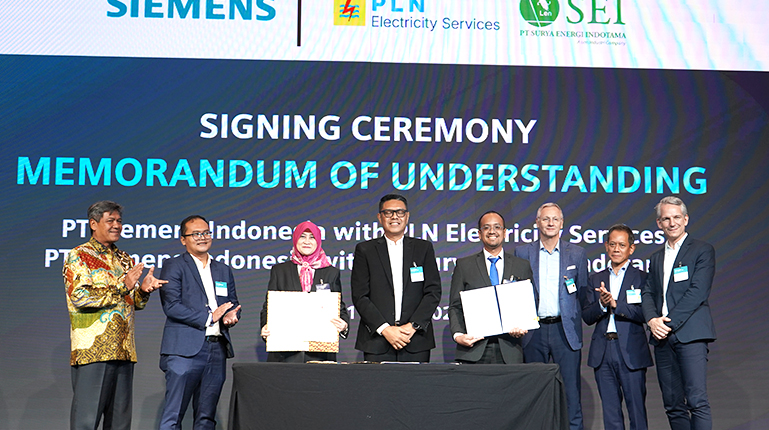
Realizing Smart Building and Energy Management System: SEI and Siemens Indonesia Collaborate
Jakarta (11/06/2025) — The acceleration of the energy transition and the global push towards low-carbon development demand a more efficient, adaptive, and intelligent building system in managing energy. Responding to this challenge, PT Surya Energi Indotama (SEI) has established a strategic partnership with Siemens Indonesia by signing a Memorandum of Understanding (MoU) at the Siemens Tech Summit 2025.
This partnership marks the commitment of both companies in providing integrated solutions for Solar Panel Developers, Smart Building solutions and smart and sustainable Energy Management Systems.
With complementary experiences and technologies, SEI and Siemens will drive digital transformation in the infrastructure sector, including workforce training, applied research, and the application of smart technology in various projects. This step is expected to create a more efficient, adaptive, and low-carbon building ecosystem.
Director Marketing and Business Development SEI, Khanestyo, explained that this partnership is in line with the company's vision as a total solution provider in the field of New Renewable Energy and Energy Conservation.
"This collaboration is very much in line with our vision as a total solution provider in the field of New Renewable Energy and Energy Conservation. We have extensive experience in solar energy projects, from small to large scale, and are ready to support energy transition efforts through a comprehensive approach," he said.
SEI has been widely recognized as a major player in the development of clean energy in Indonesia. In addition to its role as EPC (Engineering, Procurement, Construction), SEI is also active in providing O&M services, energy conservation, and technical training to increase human resource capacity.
The signing of this MoU marks the beginning of a long-term collaboration between SEI and Siemens Indonesia in responding to future energy challenges that are in line with the direction of national development with an innovative, collaborative and sustainable approach.
Berita Lainnya
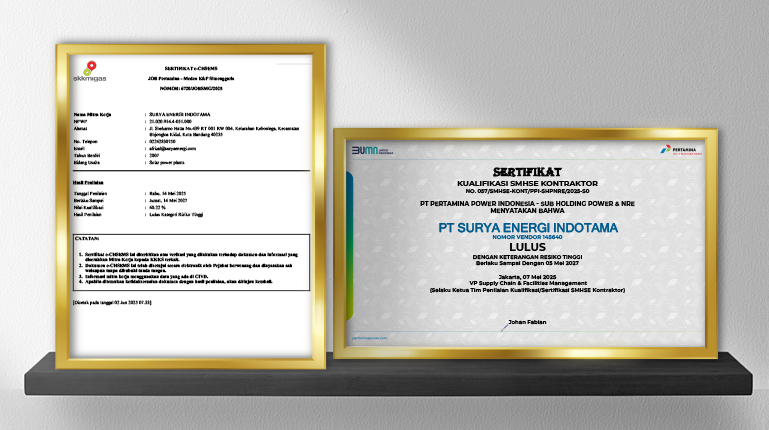
Uncompromising Commitment: SEI Earns Two CSMS High Risk Certifications
Bandung (09/06/2025) – PT Surya Energi Indotama (SEI) has reaffirmed its commitment to occupational safety by successfully achieving the Contractors Safety Management System (CSMS) Certification in the High Risk category from the CSMS HSSE assessment team of PT Pertamina Power Indonesia - Sub Holding Power & NRE. The assessment was carried out comprehensively on May 6, 2025 and May 14, 2025, with the final result stating that SEI passed with a satisfactory score.
For the Pertamina CSMS certification, SEI has gone through a series of stages, starting from the pre-qualification process to verification, with the fulfillment of all administrative requirements declared passed on May 6, 2025. The next stage is the document verification process, which is carried out through a direct visit by the assessment team to the SEI Office.
The series of document verification assessment processes consist of 8 processes, including leadership and accountability, policies and targets, organization, responsibility, resources, documents, risk management, planning and procedures, implementation and operational control, monitoring assurance, measurement and audit, and management review.
Through the CSMS assessment activity, the final assessment results stated that PT Surya Energi Indotama received a score of 85.51% with high risk criteria.
Meanwhile, for CSMS certification from SKK Migas, the assessment process was carried out on May 14, 2025, where SEI obtained a qualification score of 60.22% and was again declared to have passed in the high risk category.
With this achievement, SEI now holds two CSMS High Risk certifications at once from Pertamina and SKK Migas, strengthening the company's track record as a trusted partner in implementing a reliable work safety system in the energy and construction sectors.
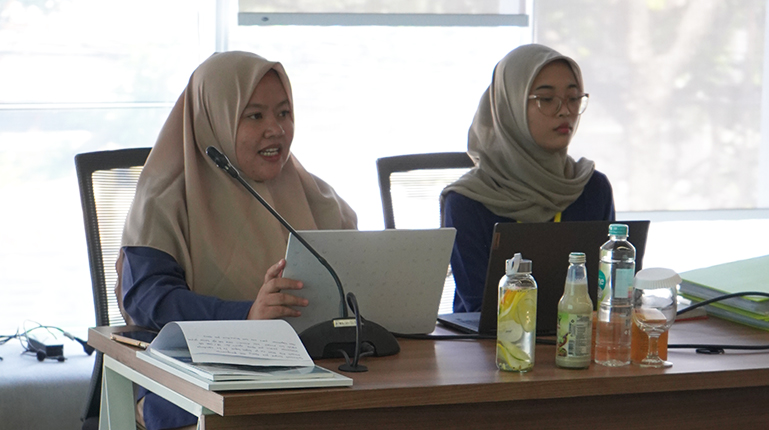
HSE Officer who is also the HSE PIC for the CSMS work, Elyana Febrianti expressed her appreciation for the positive results of this certification process
“We would like to thank you for the CSMS assessment results that have been given, especially in the Health, Safety, and Environment (HSE) aspect. We are grateful that from the two users who conducted the evaluation, we obtained the High Risk category, which in this context shows that our performance has met high standards and has been declared good and passed their CSMS qualifications.”
Elyana added that this achievement is concrete evidence of SEI commitment to maintaining the integrity of the implementation of HSE principles across all lines of the company's operations.
More than just an administrative achievement, this certification is an important foothold in SEI efforts to build a sustainable work safety culture. Elyana emphasized
“We hope that this achievement can be a strong foundation to continue to maintain and improve our HSE performance in the future. Our commitment is to make aspects of safety, occupational health, and environmental protection a top priority in every activity.”
“We are also open to any input as part of the continuous improvement process, in order to provide the best contribution to the success of the project as a whole, as well as maintain the trust of all stakeholders.”
SEI success in achieving CSMS High Risk certification from PT Pertamina Power Indonesia - Sub Holding Power & NRE further strengthens SEI's position as a strategic partner that is not only technically competent, but also excels in managing work safety and environment.**
Berita Lainnya
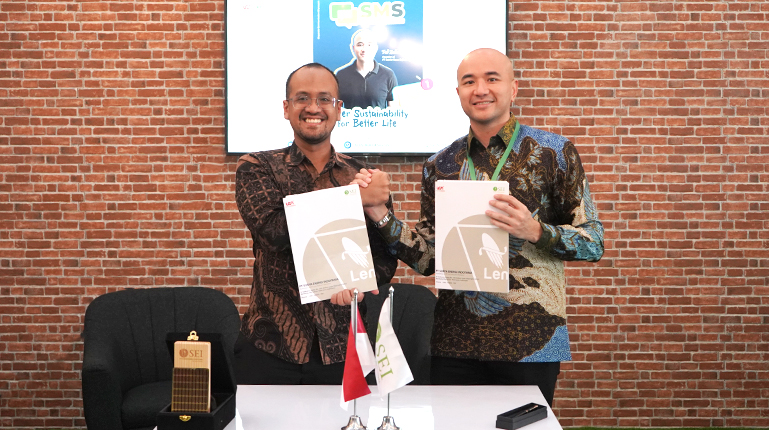
Strengthening Sustainable Commitment: SEI and SNE Sign MoU on ESG Collaboration
Bandung (05/06/2025) – In an effort to strengthen its commitment to the implementation of Environmental, Social, and Governance (ESG) principles, PT Surya Energi Indotama (SEI) has established a strategic partnership with PT Satria Nusa Enjinering (SNE) through the signing of a memorandum of understanding (MoU) which took place at the SEI office.
The signing of this MoU is an important milestone in building synergy between national companies that have a vision in line with sustainability and responsible governance. Present at the event were SEI's Marketing and Business Development Director, Khanestyo, along with the management team. Also SNE's President Director, Feli Zulhendri, along with the team.
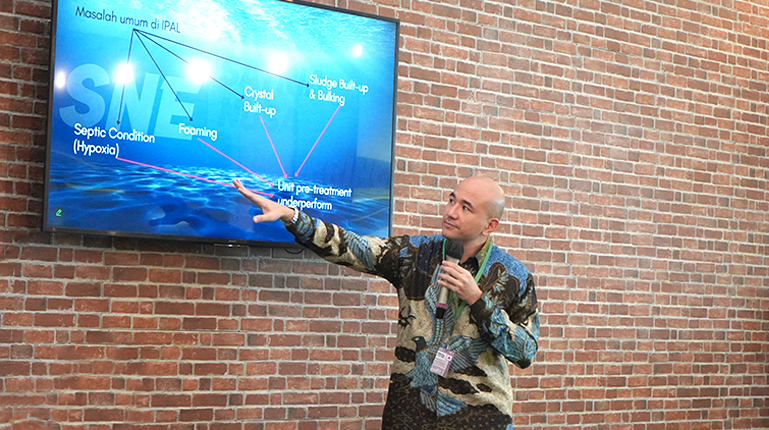
The event began with a sharing session in the SEI Morning Session program from Feli Zulhendri which raised the theme "Water Sustainability for Better Indonesia". In her presentation, Feli explained the importance of wastewater management as an integral part of sustainability solutions, and introduced an innovative approach that can turn wastewater into a source of clean water that is safe and useful. This presentation received high attention from the participants and sparked a lively discussion in the question and answer session.
This collaborative momentum was then continued with the signing of a memorandum of understanding, which became an official symbol of the start of cooperation between SEI and SNE in developing ESG initiatives that have a real impact, both in the industrial sector and the wider community.
SEI's Marketing and Business Development Director, Khanestyo, said that this collaboration is expected to open up wider collaboration space, especially in the development of green solutions and sustainable business practices. "We believe that this synergy will provide a positive contribution not only to both companies, but also to the environment and society," he said.
With a collaborative spirit and a strong vision of sustainability, SEI and SNE are optimistic that this collaboration will be an important foundation in creating relevant and useful green innovations for Indonesia's future.**
Berita Lainnya
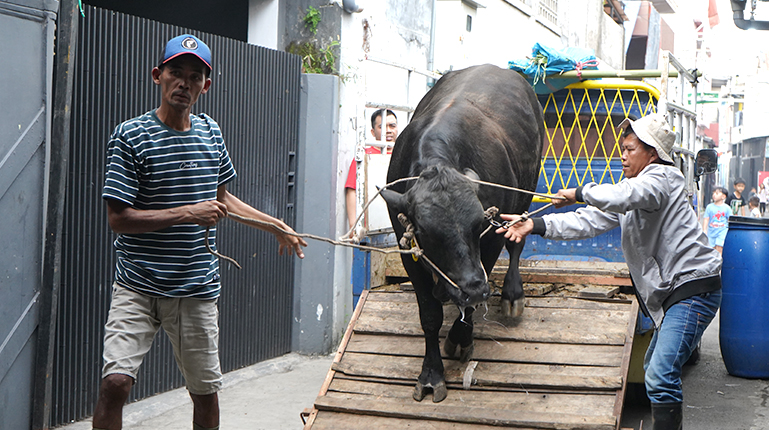
Togetherness in Sacrifice, SEI and Len Realize the Spirit of Sharing
Bandung (05/06/2025) — Welcoming Eid al-Adha 1446 H, PT Surya Energi Indotama (SEI) together with its parent company PT Len Industri (Persero), demonstrated their commitment to togetherness and social concern through a program to distribute sacrificial animals. This activity is also part of a joint initiative by Len Incorporated and Defend ID.
In the spirit of collaboration and mutual cooperation, 32 cows, 1 buffalo, and 58 goats were distributed simultaneously to various regions, including Bandung, Subang, Banten, and Surabaya. This program is not only a form of worship, but also a means to strengthen ties with the surrounding community.
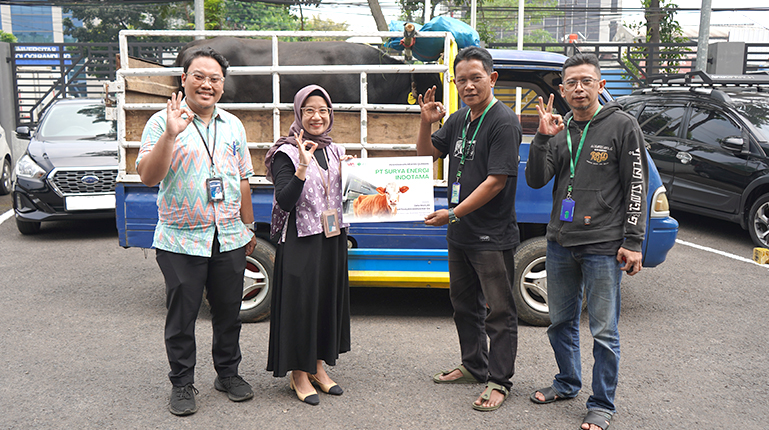
In the SEI office environment, the handover of sacrificial animals was carried out symbolically by the Acting General Manager of Human Capital & General Affairs, Dea Puspitasari, to representatives of residents of RW 04, Kebon Lega Village. This activity was also attended by the Head of RW 04 Asep Supriadi and the Head of the Qurban Committee, Koswara Somawijaya.
"Thank you very much to SEI. Hopefully these sacrificial animals will bring benefits and blessings to all residents. Aamiin,"* said Koswara.
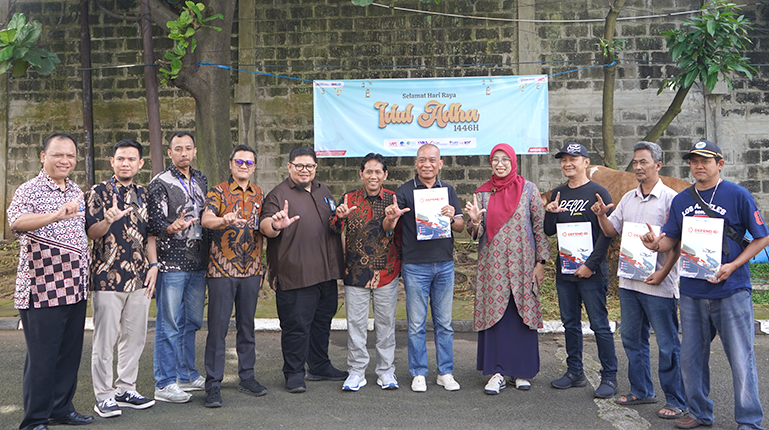
Meanwhile, at the head office of PT Len Industri (Persero), the distribution of sacrificial animals was attended by the Regol Sub-district Head, Pasirluyu Village Head, representatives of Pasirluyu Village residents, and the board of directors of Len Incorporated.
In her speech, the Director of Technology and Risk Management of PT Len Industri (Persero), Amalia Maya Fitri, emphasized that sacrifice is a symbol of the values of sincerity and empathy that must continue to be maintained, especially in the corporate environment.
"The sacrificial worship is basically a form of vertical obedience to Allah SWT. However, its social meaning is very deep. Through this program, we want to show that the company is present not only as a business entity, but also as part of a caring and sharing society,"* said Amalia.
She also emphasized that this activity is a form of the company's commitment to building harmonious relationships with the community.
"We hope that this small step can have a positive impact and strengthen the closeness between the company and the surrounding environment," she concluded.
With the spirit of sharing and collaborating, SEI and Len continue to instill the values of humanity and usefulness in every step, making Eid al-Adha not only a religious momentum, but also a social call to strengthen each other.**
Berita Lainnya
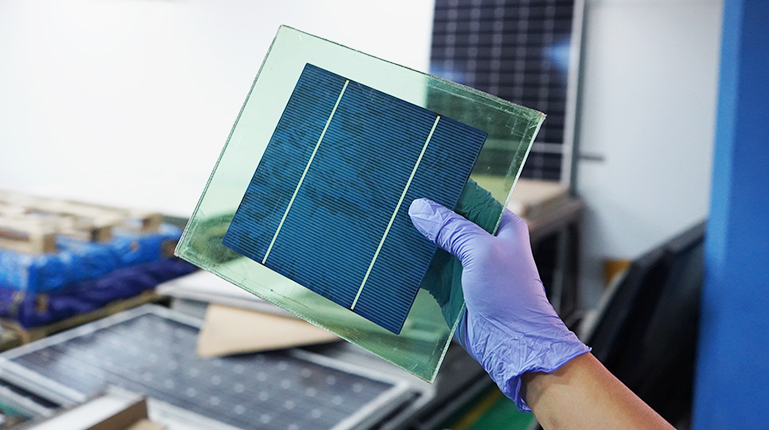
Early Traces of Indonesian Solar Energy: The First Solar Module in Len in 1998
PT Len Industri (Persero), as the parent company of PT Surya Energi Indotama, has played an important role in the history of solar energy technology development in Indonesia.
Len's commitment to national energy independence began in 1986, when the company introduced Solar Home System (SHS) technology to reach remote areas that had not been connected to conventional electricity. This initiative became the starting point for Len's real contribution to providing clean energy for the community.
Len's journey continued significantly in 1998, with the success of creating a solar module prototype. This solar module is the result of collaboration between Len, Solarex Australia, and the Agency for the Assessment and Application of Technology (BPPT). The solar module became the initial milestone in the development of photovoltaic technology in the country.
Not stopping at the prototype stage, Len developed a locally produced solar module with an initial capacity of 1.2 MW per year in the same year. Along with the development of technology and market needs, production capacity has continued to increase
- 10 MW per year in 2009
- 46 MW per year in 2015
- 71 MW per year in 2020
A major achievement was achieved in 2016, when Len succeeded in becoming the first largest solar panel project implementer in Indonesia, namely the IPP PLTS Oelpuah Kupang with a capacity of 5 MW. This project is a symbol of the clean energy transition and the revival of the national photovoltaic industry.
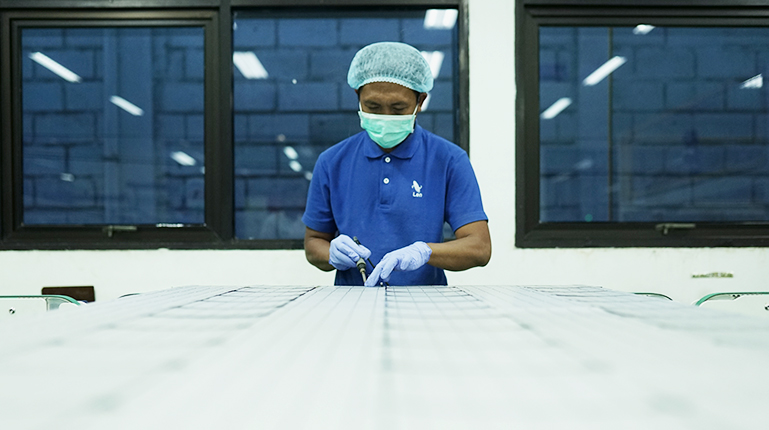
Over time, Len also continues to develop production facilities and obtain various national and international quality certifications, strengthening Len's position as a Pioneer Solar PV Manufacturing in Indonesia.
Now, the solar panel production facility has been acquired by PT Surya Energi Indotama as a subsidiary, to continue the development and industrialization of solar energy technology in a more focused and integrated manner.
"From one small solar module in 1998, to a big step for the country"
Through PT Surya Energi Indotama, we continue to be committed to providing reliable and sustainable renewable energy solutions for all Indonesian people**
Berita Lainnya
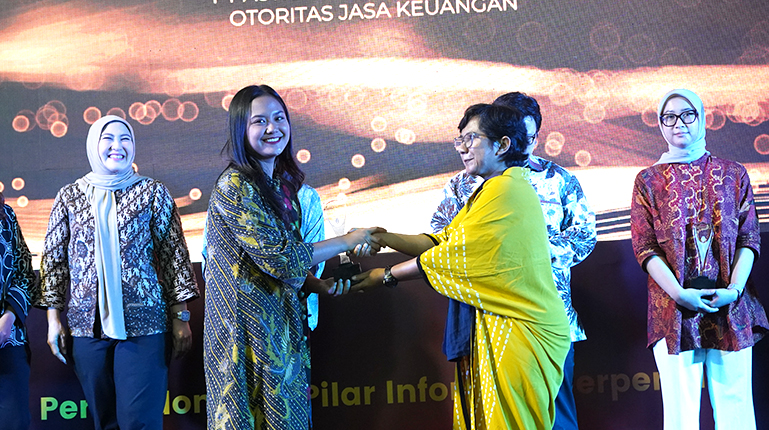
Digitalization Produces Sweetness, SEI Wins Best Corporate Website at the 2025 SPS Awards
Jakarta (05/23/2025) – PT Surya Energi Indotama has once again made a brilliant achievement by winning a prestigious award from the Press Company Association (SPS) at the 2025 Indonesia Digital Media Award (IDMA) held at the Press Council Hall, Jakarta. The award was given for the Best Corporate Website category, as a form of appreciation for the company's commitment to presenting a digital platform that is informative, innovative, and responsive to public needs.
The SEI website is considered capable of presenting relevant and easily accessible information, while also reflecting the company's enthusiasm in following the development of digital technology in the current industrial era.
The General Chairperson of SPS, Januar P. Ruswita, in his speech said that all the awards given tonight had gone through a long and selective process. "This award went through several important stages, starting from collecting 570 entries, a judging process carried out by professionals in their fields, until finally the winner was chosen who deserved appreciation," he said. He also expressed his gratitude and appreciation to all participants who had participated in this event.
Carrying the theme "Indonesian Press, Pillar of Trusted Information", the 2025 SPS Award is expected to be a momentum to continue to encourage press companies and corporations in Indonesia to develop credible and positively impactful digital media.
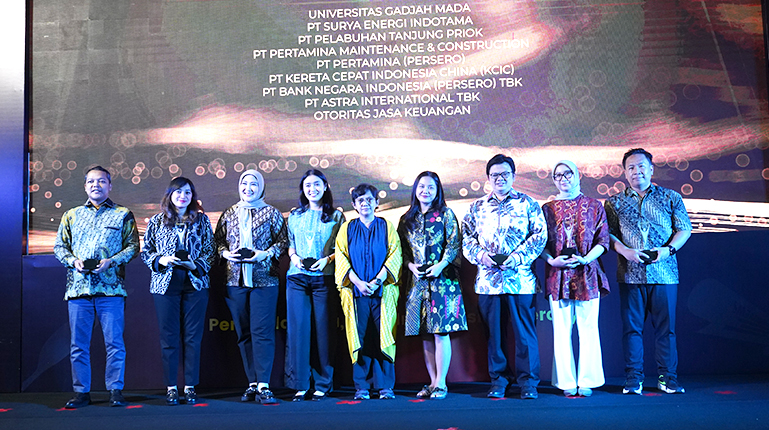
Also present at the award night were SEI Corporate Secretary Manager, Nefi Friyanti, along with the Corporate Communication team to receive the award in person. In her statement, Nefi expressed her pride and gratitude for the team's hard work that has so far encouraged the digitalization of information in the company environment.
"This is the result of the collective work of the entire team, and we greatly appreciate this achievement. Hopefully this award will be a trigger for enthusiasm to continue to improve the quality of digital information delivery that can provide positive contributions, especially for the Company and also the wider community," said Nefi.
This award is real proof that SEI continues to innovate in delivering accurate and easily accessible information to the public, as well as strengthening the company's role as part of a trusted information pillar in Indonesia.
Berita Lainnya
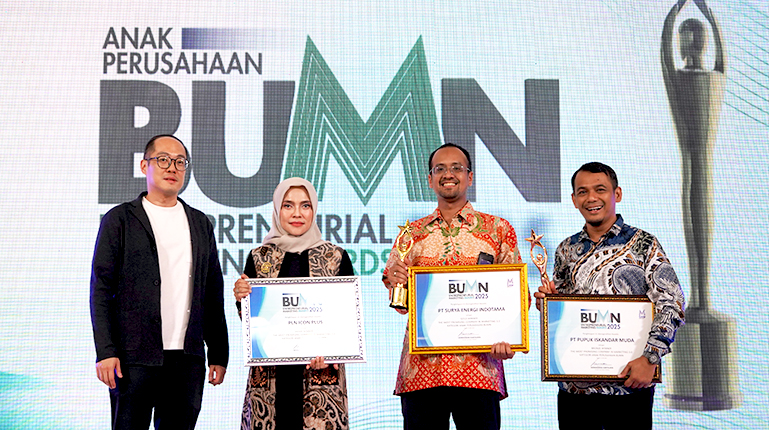
SEI Wins Two Awards at BUMN Entrepreneurial Marketing Awards 2025
Jakarta (21/05/2025) — PT Surya Energi Indotama (SEI), a subsidiary of a state-owned company engaged in renewable energy, has once again made a proud achievement by winning two prestigious awards at the 2025 BUMN Entrepreneurial Marketing Awards held by MarkPlus Inc.
In the annual event held in Jakarta, SEI won the Gold Winner in the category "The Most Promising Company in Marketing 3.0" and the Silver Winner for the category "The Most Promising Company in Marketing 5.0" both in the BUMN subsidiary category.
The event was attended by various important figures from BUMN, BUMD, industry players, and marketing and business practitioners. Also present to receive the award was Director of Marketing and Business Development, Khanestyo. In an interview, Khanestyo expressed his appreciation for the award given and the hope that this achievement would be a trigger to continue innovating and becoming better.
"Thank you to MarkPlus Inc. for giving us this award. Hopefully, this award can make us better in providing positive contributions to the Company and the renewable energy sector in Indonesia. Continued success for MarkPlus," said Khanestyo on the sidelines of the award ceremony.
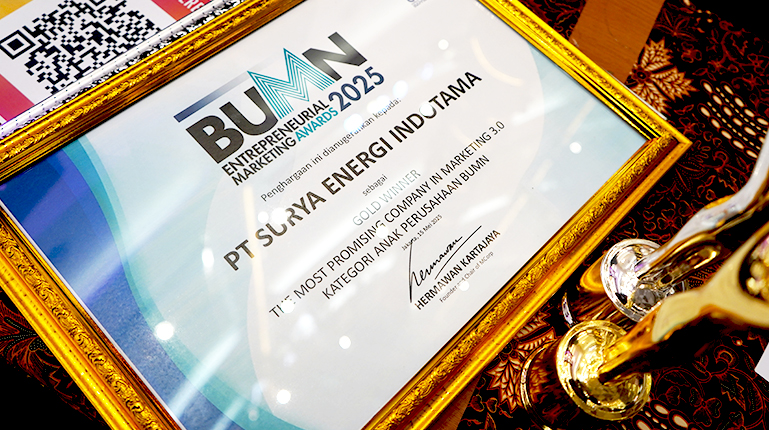
The BUMN Entrepreneurial Marketing Awards event is a form of appreciation for the best marketing innovation and performance from state-owned companies and their subsidiaries.
The Marketing 3.0 award received by SEI highlights the company's success in integrating humanitarian, social, and environmental values into its marketing strategy. This approach reflects SEI commitment to not only selling products and services, but also building meaningful relationships with consumers and communities.
Meanwhile, the Marketing 5.0 award signifies SEI readiness to utilize cutting-edge technology including big data and digital automation to create a more relevant, efficient, and future-oriented marketing experience.
These two awards show that SEI is not only adaptive to change, but also a company that can implement a holistic and sustainable marketing approach in the renewable energy sector.
SEI's achievement is real evidence of the company's commitment to adopting a modern marketing approach that is not only focused on profit, but also creates sustainable social and digital value.
This success is expected to motivate SEI to continue to develop and make a real contribution to the progress of the renewable energy sector in Indonesia.**
Berita Lainnya
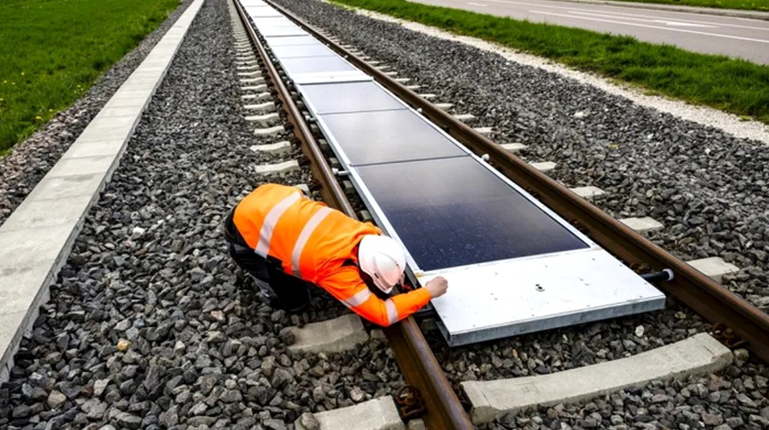
Switzerland Becomes First Country to Install Solar Panels on Railway Tracks
Clean energy innovation now comes from Switzerland. The country known for its precise transportation system has once again made a breakthrough through a pilot project of solar panels on active railway tracks. This project was initiated by Sun-Ways, a Swiss startup that focuses on the development of renewable energy technology.
Different from solar energy projects in general which require special land or building roofs, Sun-Ways presents a unique solution, namely installing solar panels directly between active railway tracks.
The technology used also allows trains to continue operating without interruption, opening up great opportunities for the utilization of infrastructure space that has not been optimally utilized.
"This will be the first time that solar panels have been installed on railway tracks that are passed by trains," said Joseph Scuderi, CEO of Sun-Ways, quoted from ESG News.
In the pilot phase, 48 solar panels will be installed along 100 meters of rail, which is located in the Neuchâtel region, western Switzerland. Where the panels will be installed using a specially designed train by Swiss rail maintenance company Sceuchzer, which is capable of installing up to 1.000 square meters of panels per day.
The results of this power will not be channeled to the railway system due to the complexity of current railway operations. The system is expected to be channeled to local homes because it is estimated to be able to produce 16.000 kWh of electricity per year.
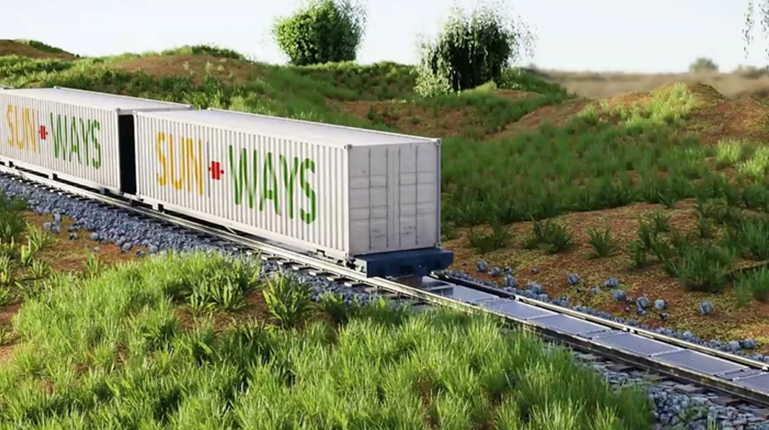
Global Potential
The Sun-Ways project offers a smart solution, using existing infrastructure to add renewable energy capacity, without putting pressure on open space or green spaces.
The potential for this technology is huge. Imagine if just a small portion of the track was equipped with solar panels, the world would have a significant additional source of clean energy, without harming the environment.
And if this project is successful and widely replicated, it is possible that we will see railways around the world become not just travel routes, but clean energy routes of the future. Cool, right?
Berita Lainnya
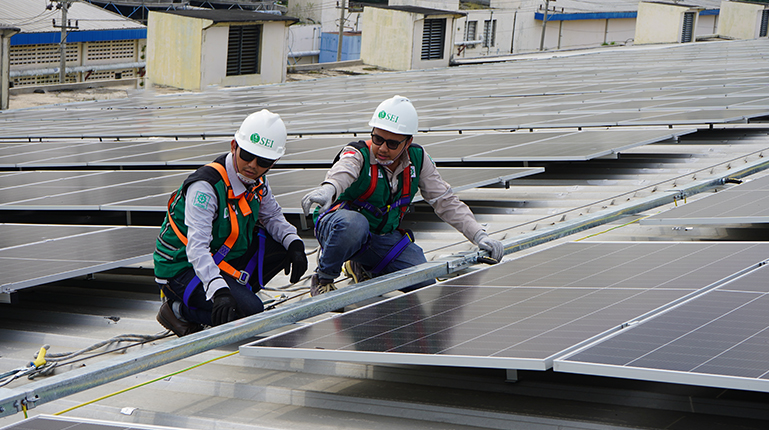
1.7 Million Green Job Opportunities Await in 2030
Indonesia, as an archipelagic country with abundant natural resources, has extraordinary potential in developing the new and renewable energy (EBT) sector. Through the National Energy General Plan (RUEN), the government is targeting a gradual energy transition in order to realize national energy security and reduce dependence on fossil fuels. The year 2030 is an important milestone, where the projection of EBT capacity and contribution is expected to experience a significant spike. In addition to environmental benefits, this transition also has the potential to create millions of green jobs. Based on Greenpeace's calculation method, the following is a projection of the potential for job growth from each EBT sub-sector in Indonesia until 2030:
1. Geothermal

Indonesia is one of the countries with the largest geothermal reserves in the world. Geothermal development not only supports carbon emission reduction, but also opens up jobs in the fields of exploration, power plant construction, and operation and maintenance.
2. Hidropower
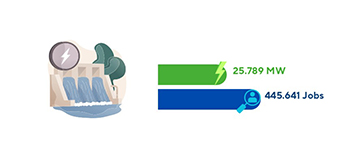
With its river-rich and mountainous topography, Indonesia has great potential in utilizing hydropower. Large-scale and micro-hydro projects can increase electricity access in remote areas while absorbing local labor.
3. Bioenergy

Biomass resources from agriculture, plantations, and organic waste make bioenergy an inclusive, sustainable energy solution. This sector also supports the rural economy through the use of agricultural waste as fuel.
4. Solar Energy

Solar energy is one of the fastest growing renewable energy sources because the technology is increasingly affordable and easy to implement. Installing solar panels on rooftops, industrial buildings, remote areas and public facilities will provide jobs for more people.
5. Wind Energy
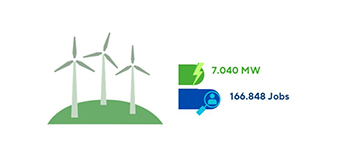
Coastal and highland areas in Indonesia have great potential for wind power development. Wind energy development requires technical expertise and will drive workforce growth in the engineering and maintenance sectors.
6. Renewable Energy

Included in this category are energy from ocean waves, tides, and other innovative technologies. Although still in its early stages, the potential of this sector should not be ignored as part of Indonesia's future energy portfolio.
With a total additional capacity of 69,652 MW from all types of renewable energy, Indonesia has the potential to create around 1,721,435 green jobs by 2030. This figure reflects a great opportunity to combine the economic development and environmental protection agendas simultaneously.
The transition to clean energy is not only an ecological necessity, but also a strategic opportunity to encourage inclusive and sustainable economic growth. The government, private sector, educational institutions, and civil society need to collaborate to ensure workforce readiness through vocational training, increasing human resource capacity, and aligning the education curriculum with the needs of the renewable energy industry.
2030 is not just a target, but the starting point for Indonesia's clean, green, and opportunity-filled future.
